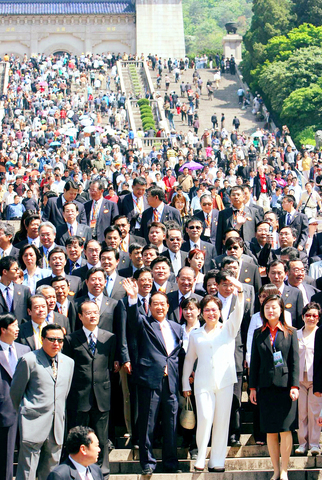Calling on Chinese people everywhere to unite, People First Party (PFP) Chairman James Soong (宋楚瑜) yesterday paid homage at the Nanjing grave of Sun Yat-sen (孫中山), founding father of the Republic of China.
Speaking at Sun's mausoleum yesterday morning on the third day of his journey in China, Soong praised Sun's democratic principles while urging the Chinese people on either side of the Taiwan Strait to work together.
"Chinese people must help Chinese people. Mr. Sun would not want the Chinese people to become like scattered grains of sand and would hope for the sons of China to unite," Soong said.

PHOTO: AP
He and the PFP are faithful followers of the democratic tenets Sun outlined in his treatise, Three Principles of the People, Soong said yesterday, citing Sun's words: "peace, striving and saving China."
At the mausoleum, Soong added that he promised to make all of the Chinese people understand that the work to build the prosperity and strength of the nation is not yet over.
Both sides of the Taiwan Strait must continue working, since the Chinese world is not yet united. The brothers on either side of the strait must work harder," Soong said.
Soong's visit to the mausoleum came at the end of the second leg of his China trip, which marks the second such trip made by a Taiwanese opposition figure this week. While both Soong and the PFP have resisted comparisons to their rival the Chinese Nationalist Party (KMT) and its chairman Lien Chan (
Given that Lien's visit produced a five-point communique between Lien and Chinese President Hu Jintao (
After visiting the mausoleum, Soong flew to Shanghai. After meeting with China's top negotiator with Taiwan, Wang Daohan (王道涵), this morning, Soong is scheduled to fly to Changsha, where his family's ancestral graves are located. Soong will be met in Changsha by his son and 87-year-old mother, who left for Changsha via Hong Kong yesterday morning.

The Mainland Affairs Council (MAC) today condemned the Chinese Communist Party (CCP) after the Czech officials confirmed that Chinese agents had surveilled Vice President Hsiao Bi-khim (蕭美琴) during her visit to Prague in March last year. Czech Military Intelligence director Petr Bartovsky yesterday said that Chinese operatives had attempted to create the conditions to carry out a demonstrative incident involving Hsiao, going as far as to plan a collision with her car. Hsiao was vice president-elect at the time. The MAC said that it has requested an explanation and demanded a public apology from Beijing. The CCP has repeatedly ignored the desires

Many Chinese spouses required to submit proof of having renounced their Chinese household registration have either completed the process or provided affidavits ahead of the June 30 deadline, the Mainland Affairs Council (MAC) said on Thursday. Of the 12,146 people required to submit the proof, 5,534 had done so as of Wednesday, MAC deputy head and spokesperson Liang Wen-chieh (梁文傑) said. Another 2,572 people who met conditions for exemption or deferral from submitting proof of deregistration — such as those with serious illnesses or injuries — have submitted affidavits instead, he said. “As long as individuals are willing to cooperate with the legal

The Ma-anshan Nuclear Power Plant’s license has expired and it cannot simply be restarted, the Executive Yuan said today, ahead of national debates on the nuclear power referendum. The No. 2 reactor at the Ma-anshan Nuclear Power Plant in Pingtung County was disconnected from the nation’s power grid and completely shut down on May 17, the day its license expired. The government would prioritize people’s safety and conduct necessary evaluations and checks if there is a need to extend the service life of the reactor, Executive Yuan spokeswoman Michelle Lee (李慧芝) told a news conference. Lee said that the referendum would read: “Do

Taiwan's Vice President Hsiao Bi-khim (蕭美琴) said Saturday that she would not be intimidated by the Chinese Communist Party (CCP), following reports that Chinese agents planned to ram her car during a visit to the Czech Republic last year. "I had a great visit to Prague & thank the Czech authorities for their hospitality & ensuring my safety," Hsiao said on social media platform X. "The CCP's unlawful activities will NOT intimidate me from voicing Taiwan's interests in the international community," she wrote. Hsiao visited the Czech Republic on March 18 last year as vice president-elect and met with Czech Senate leadership, including